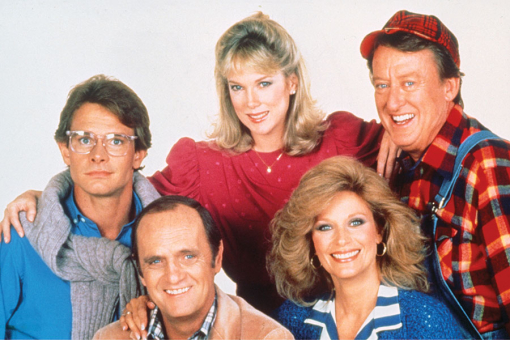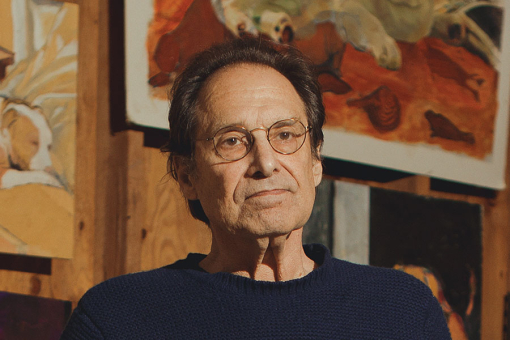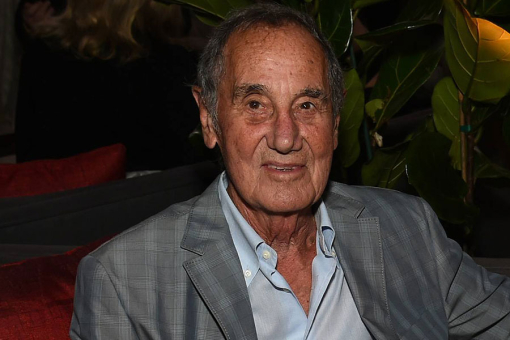In memory of Jack Carter, we here share a story that ran in emmy magazine in February 2013.
Most of the pioneering stars of live television’s early heyday are no longer around — and if they are, they certainly aren’t working.
Then there’s Jack Carter, still kicking it at nearly 90.
The comedian, who will celebrate that milestone birthday this June, has appeared on TV nonstop for more than 60 years — since 1949, when he hosted the first Saturday-night variety hour, Dumont’s Cavalcade of Stars (a show later hosted by Jackie Gleason).
A brash stand-up, Carter drew big laughs with his rapid-fire one-liners and comic impressions, but he sang, danced and performed sketch comedy, too.
In the 1950s, he was the quintessential funnyman. Different from Lenny Bruce, Mort Sahl and later comedians who focused on social commentary, Carter had no message in his shtick. His aim was strictly to entertain.
Today, he is still juggling a busy schedule, guest-starring on New Girl, Shameless, Parks and Recreation and Rules of Engagement, among other current hits.
A Brooklyn, New York, native, Carter attended the Academy of Dramatic Arts on a scholarship. He performed in summer stock and so impressed a producer with his off-stage impersonations that he soon had an agent.
Next thing he knew, he was working as a stand-up comedian and was the winner — three weeks in a row — of radio’s Major Bowes Original Amateur Hour. That led to a nationwide tour in Bowes’s company, alongside a young Frank Sinatra and his Hoboken Four. Then came gigs at big-time venues like New York’s Paramount Theatre and the Copacabana nightclub.
Carter broke into television at 26 as emcee of ABC’s American Minstrels of 1949, featuring comics in blackface (a feature that was soon discarded).
After one season of Cavalcade of Stars, he starred in The Jack Carter Show, part of NBC’s new and innovative Saturday Night Revue. The Revue featured the highly popular Your Show of Shows, starring Sid Caesar and Imogene Coca.
By summer 1951, Carter’s hour was canceled, partly owing to similarities in the two Revue segments. He then costarred in the Broadway musical Mr. Wonderful, headlined a series of TV specials, including Jack Carter and Company, and scored more than 60 appearances on The Ed Sullivan Show.
He even hosted The Tonight Show for four weeks before Johnny Carson stepped behind the desk, replacing Jack Paar.
Carter then launched an uninterrupted run of guest-starring roles on both comedy and dramatic series that continues to this day, despite serious leg injuries he suffered three years ago when a car struck him in Hollywood.
Emmy contributor Jane Wollman Rusoff chatted by phone with the peppy Carter, who was taking a time-out one afternoon at home in Beverly Hills.
When was your first television appearance?
In 1947, from the cellar of Wanamaker’s department store in New York — it was a show that was trying to sell TV sets. The lights were crazy. It was so hot you had to take your clothes off.
Tell me about The Jack Carter Show….
We did it from Chicago, so we had to import all the acts. Every show was a beauty. I had George Raft on the first one. He was scared to death because he’d never done live television. We had to put signs in the wings for him to read.
How did it do in the ratings?
We were a smash! So they gave me a big raise, from $3,250 to $3,500 a week. The guest stars were getting $7,000. William Morris, my agent, sold me down the river.
Max Leibman, director of Your Show of Shows, was unhappy that you were performing comedy sketches, dance numbers and opera, because that’s what Your Show of Shows was doing. What happened?
I got called into [NBC’s vice-president of programs] Pat Weaver’s office. He said, “Great show! Cut it out! Max Leibman is going crazy. You’ve got to stop. He won’t allow you to write your show every week until after his is written. He wants you off the air.”
How did you respond?
I kept doing what I wanted to do till the end of the season. But Leibman screamed and yelled and ordered it, and they listened to him. They took me off.
Nowadays, you’re doing nude scenes on Shameless. Guess you’re not shy about that, either….
It doesn’t bother me. They had to cut my T-shirt in the back to make sure my tuchus hung out when I was looking out the window. For frontal nudity, I put on a jockstrap.
The makeup and wardrobe girls said nudity wasn’t their job. They insisted that my agent handle my body.
What do you remember about performing on The Ed Sullivan Show?
At the run-through, you did 12 minutes. Then it was cut to six. By the time you got on stage, it was down to four. That meant you had to go out and restructure your act on your feet. Ed stood on stage while you worked, so the audience would look at him first to see his reaction to your jokes.
What was Sullivan like to work with, otherwise?
At 4 p.m. on the day of the show, this man —who was so gentle and puritanical on camera — would curse you out with filth you wouldn’t believe, telling you what you couldn’t say on his show.
I had a big argument with him. He said: “You can’t say navel or bellybutton! It’s an aperture of the human body!” So I had to take the joke out.
Let’s go back to The Jack Carter Show’s leaving the air. What was your next step?
I went with a different agent, Freddie Fields, who was a powerhouse. But I knifed him in the back when William Morris offered me a big pilot, and I went back with them.
The pilot was a bomb because they hired a director who was told to keep me down — like I was an enfant terrible.
Were you?
I had the reputation of being a troublemaker because I knew what I wanted. When I had good people around me, they loved me.
You were a regular on The Judy Garland Show and did a Hollywood Palace show with her, too — a highly unusual one.
Judy did the dress rehearsal, and she killed. But she wouldn’t go on again for the actual show. This woman didn’t build up twice! So, for the show, we played the [taped] rehearsal, and I talked to her as if she had just performed it. It saved the day.
What do you recall about appearing on the anthology series Alfred Hitchcock Presents?
[In one episode] Dorothy Malone was faking a slap, and it didn’t look real. When I asked her to smack me hard, she knocked me out cold!
You were friendly with Lucille Ball and directed a couple of Here’s Lucy episodes. How did that go?
I got to know Lucy through my ex-wife Paula Stewart, who was in Wildcat with her on Broadway. Lucy was dating terrible guys [after divorcing Desi Arnaz].
So we brought around Gary Morton, a lowly comedian. She liked him because he put her down: “What are you, a big shot? I don’t need you! You don’t scare me, lady!” She loved it. Their marriage lasted 28 years [until her death].
How was it to direct Lucy?
With the first show, she didn’t bother me, and it went great. The next one was a disaster. When I got back from lunch, I discovered she had restaged the whole show.
We didn’t talk for a long time. I finally made up with her when she got sick. We’d bring her my [present] wife Roxanne’s homemade blintzes. She loved them.
What are your memories of Elvis Presley? You did a scene with him in the film Viva Las Vegas….
He was an angel, the sweetest kid that ever lived. We remained friends for life.
You were supposed to play Arthur Spooner, the father on CBS’s King of Queens. What happened?
They roared at my audition. But while I was shooting the pilot, I could see something was going on because they were toning me down. When I finished, I got word that Jerry Stiller was going to do the show.
That must have been disappointing.
Oh, boy, yeah. I’ve had those kicks in the career time and time again.
If you had it to do over again, what would you have done differently?
Maybe I’d get better people to handle me. I was stupid. And I’m too negative. Everything that came up, I would say, “No, I can’t. It’s not going to work out.”
What’s your key strength?
My energy, drive and will to make good. I have a kind of confidence that overcomes the fear of walking out to that mike. I keep moving. But I can’t move as much now — I use a walker. For my last three jobs, my agent was Blue Cross!












